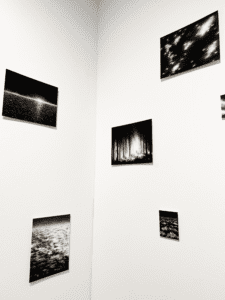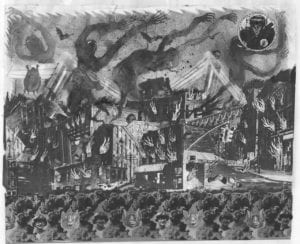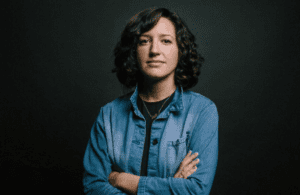top image // Double Violet from Congregation of Wits by Andrew Cornell Robinson, where he drew inspiration from platforms like Instagram, stickers, and street art to create prints with unique drawings and corresponding text messages.
Experiencing art is wonderful, but experiencing artists is the REAL real. If you haven’t graduated from passive museum viewer yet, give yourself permission already!
For most collectors, acquiring objects quickly pales in comparison to hanging out with their makers. In fact, getting to know artists is what turns people into serious collectors—at any budget. A trip through an artist’s psyche beats the hell out of any other mind-altering experience I’ve ever had, and it’s hangover free…most of the time. 😉
As always with art, those first few steps can be daunting. So here are the Do’s and Don’ts of talking to artists about their work.
Don’ts—unless an artist specifically asks you to, don’t criticize their work. Not to them. Not in earshot of them. Not in earshot of their crew. I was walking out of a show the other night when someone blabbed, “Why’s she still in there? She didn’t even like his work.” One of the artist’s friends overheard, and it wasn’t pretty. They definitely won’t be welcome at that artist’s shows anymore and probably not in that gallery. We all have the right to make our own aesthetic choices, but artists bare their souls in the public arena. When you dare greatly, you risk falling on your face. So give them the respect they deserve and keep any negativity to yourself.
During our recent studio visit, Ellen Jong confirmed the second biggest Don’t. Don’t ever ask an artist, “What if you [fill in the blank]?” Unsolicited suggestions tend to come across as passive-aggressive criticism. So keep them to yourself, too. If an artist wants your opinion about how to improve their work, they’ll ask. If they do, then get deep into it.
We’ll get to the way more interesting Do’s next, but I couldn’t resist including some of the most egregious questions that artists shared with me last week. Their (mainly) imaginary responses to these very real questions tell you everything you need to know about why you should never let them cross your lips.
Andrew Cornell Robinson @tohellwithculture Q: “If you could change anything about your work, what would it be? A: Right now, the audience.”
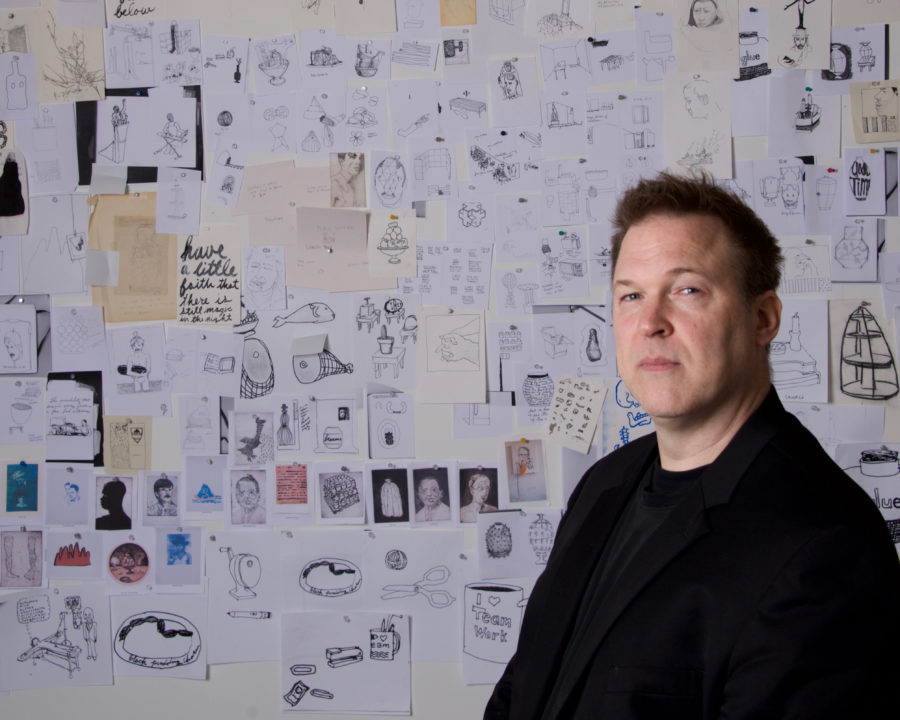
Andrew Cornell Robinson 2018, photograph by Michael Chiabaudo. Check out Andrew’s work in person in December at Satellite Art Show during Art Basel Miami or right now on Curatious.
Veronica Winters @paintingfemininebeauty Q: “How long did it take you to paint that? A: 49 years….”
David Donnelly @df.donnelly Q: “Do you have this in blue? That would match my wallpaper. A: How attached to that wallpaper are you?”
T.J. Mathews @tjmathews Q: “So what is it? A: It’s abstract art. Q: No, really, what is it?”
Do’s—ask open-ended questions. Then shut up and listen. Especially when you’re really excited about the work, this one can be hard. Being the Chatty Cathy that I am, I’m good with open-ended questions. Unfortunately, I’m a work in progress on the shut-up-and-listen part. But the idea of having more transcendent art experiences is a great motivator. Here’s more questions from artists that’ll help you do that.
Veronica Winters @paintingfemininebeauty “What is your inspiration?”
Laurence de Valmy @laurencedevalmy “My favorite question is what is your message/goal with your work?”
Andrew Cornell Robinson @tohellwithculture “How’d you do that?”
I usually start with, “Would you tell me about your work?” This question immediately sets up the artist to lead the conversation. They can take me out of my world and into theirs, bulldozing any limited thinking I might have had about their work. So, if I haven’t already gotten that punch in the gut, this is usually when it comes. I also get to test my eye. Did I get what they’re trying to do with their work on my own? When I do get it, the rush of emotion is addictive. If I haven’t, their illumination of their work refines my image bank and my overall understanding of art.
Use your questions to establish a shared vocabulary. Not to get teachy on ya, but here are some basics of art criticism. Analyze the artwork you’re experiencing—describe it, interpret it, and evaluate it. To do this, think in terms of the form you’re seeing, the content that the form communicates, and the craft/material that went into making it.
To get at all of this, I like to ask questions that start with why. Why are they drawn to certain shapes (form)? Why do they make the kind of work they make (content)? Why do they use a particular medium (craft/material)?
For instance, the prints featured here from Andrew Cornell Robinson are really fun to look at. With bright colors and lots of recognizable images, it could seem like they’re just visual whimsy. Especially the big hams that keep showing up in them. Until you ask, “Why the ham?” Then you find out that he was reading Why Heaven Hates Ham by Christopher Hitchens while traveling in Spain and discovered that the Spanish tradition of offering a plate of ham to guests didn’t just start because their ham is so yummy. In post-Moorish Spain, ham was also a religious test to reveal who was Christian and who wasn’t. Not so whimsical anymore, huh?
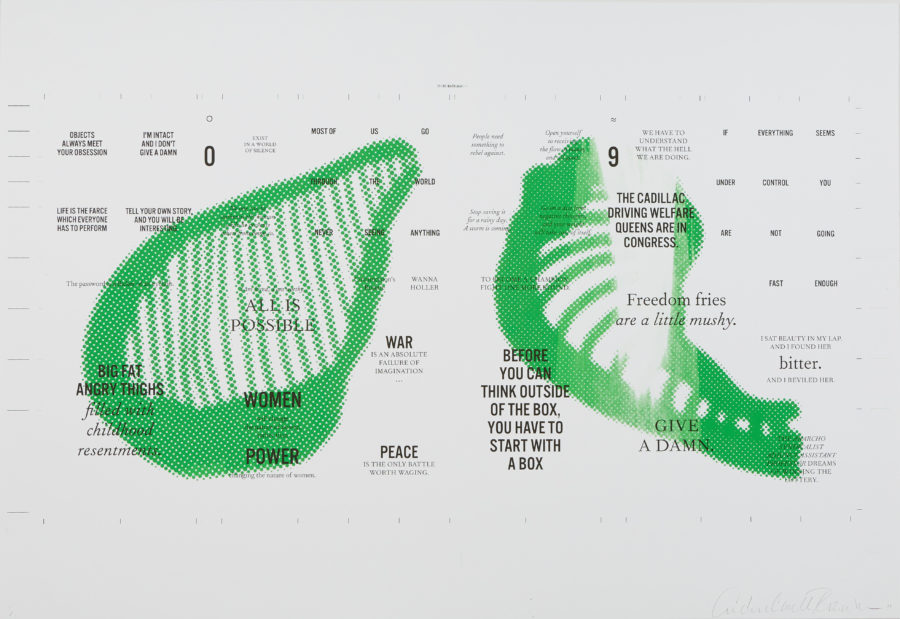
Double Green 0,9 B (Big Fat Angry Thighs Filled With Childhood Resentments) from Congregation of Wits
Here are some questions I hadn’t thought of before that readers shared with me last week. I’ll definitely be asking them from now on, and you should, too.
Michael Tanney @mdtanney “I like asking artists who their favorite artists are and why.”
Stephanie Diamant @mixmediabysteph “I wish they would ask me to explain my feelings behind the work and not just the inspiration!”
Emma Thurgood @persistent_nomad “I wish people were more interested in asking about the narratives and mythologies of artwork.”
Hanae Utamura @hanae_utamura“ What is your dream project? I thought this was a fantastic question to be asked.”
Enormous thanks to everyone who contributed to this column! I wish I could’ve included all your insights here, ut you can still check them out on my social feeds—both the Insta thread and the FB comments are fab. I’d also love to hear more of your thoughts about other topics I can write about to build bridges between artists, art lovers, and collectors. DM me on Instagram, Facebook, or Twitter!
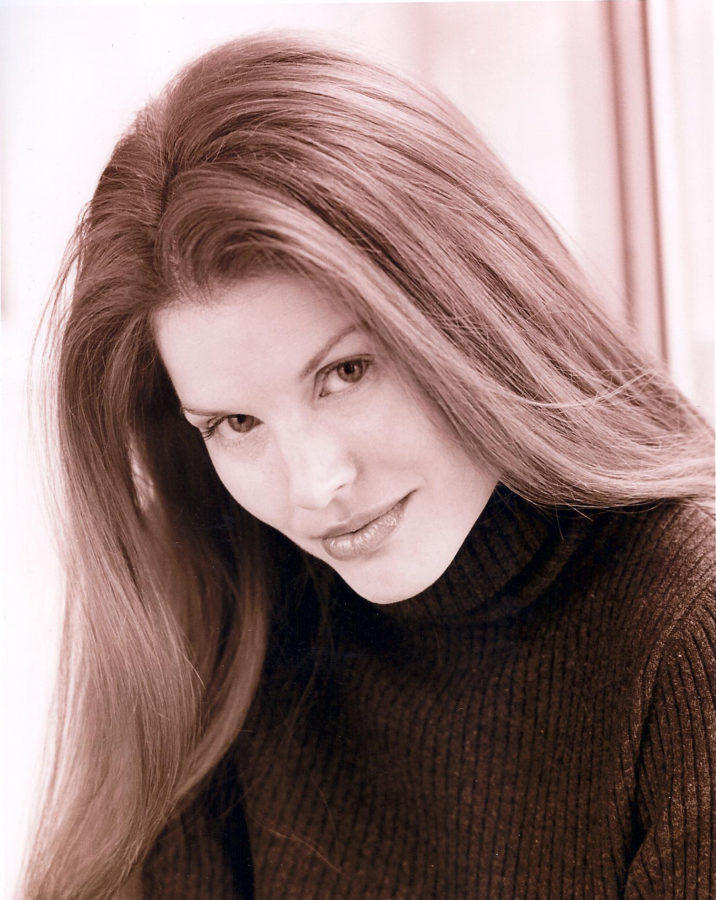
Holly Hager is an art collector and the founder of Curatious. Previously an author and a professor, she now dedicates herself full-time to help artists make a living from their art by making the joys of art more accessible to everyone.

